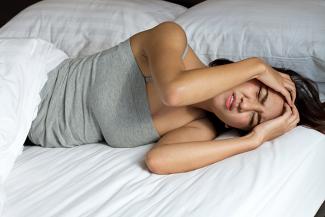
Migraines can disrupt your life severely, but the best way to keep them in check is to identify and eliminate the triggers, suggests Abha, 40, who has been having chronic migraines for the last 20 years and maintains a trigger diary to reduce attacks.
Please tell us a bit about your condition.
I suffer from Chronic Migraines! I was diagnosed almost 20 years ago. I was about 20 years old at the time.
Is there a history of migraines in your family?
My aunt suffered from migraines too, but her condition started when she was 40 years old and resolved by age 48.
What were the early symptoms?
It started with headaches during college when I was studying for my MBA. In school, I was into sports, swimming, music and dance. Most of these activities and practice would take place in the sun but I never got a headache then. The initial headaches were presented with severe throbbing on the left side of my head, or would start from the occipital area and radiate to the rest of the head. Initially the attacks would occur once in 2-3 months and would last anywhere from 24 to 36 hours. It would be accompanied by a lot of nausea and vomiting.
It took me 3-4 years before I consulted a Neurologist and got the proper diagnosis because I kept thinking they were just normal headaches. People round me had also told me that, and dismissed the attacks as regular headaches. My neurologist put me on some medications but other than putting on weight, it did little for my migraines. I visited other neurologists over the next 4 years and tried several medications but none that truly helped. The side-effects of all the medications were not fun.
Please describe your migraines triggers.
There are various types of triggers for my migraine attack. I cannot tolerate any sunlight, glare from the computer screens, bright lights, and loud noises. All the gadgets in my house including my cell phone are on the lowest brightness possible. I always prefer dim lighting and curtains to be drawn during the daytime. I avoid all types of fermented, spicy, pungent and overly sour foods. Essentially any food item that is difficult to digest is off the list, including meat products. I keep away from all aerated drinks and alcohol because even a glass of desert wine has caused an attack in the past.
I think each person needs to figure what their triggers are by method of elimination such as what and when they ate or slept for the last 5 days of the migraine. Writing it down in a diary is a useful way to keep a record.
I have done that over the past 20 years. However, avoiding all triggers does not mean that migraines are prevented completely.
My migraines continue to come and the reasons could be many such as a hormonal drift. Just before my menstrual cycle every month i.e. during PMS, I do get one or two migraine attacks. Also mid-cycle, I have experienced attacks. During my pregnancy, the first trimester was very tough. My migraine attacks increased in quantity and intensity; an attack would even last for 72 hours. The worst part about that was the restriction of medication use due to the pregnancy to alleviate the attacks. The attacks subsided in the 2nd and 3rd trimester luckily. However, the attacks resumed post-delivery. Handling a baby during attacks was extremely difficult. Just the sound of my baby crying would aggravate the sound sensitivity and trigger the onset of another migraine. As a woman who may already be undergoing post-partum depression, migraine attacks just add on to the fragile mental health of a new mom.
Read more: 6 Top Migraine Triggers and Pro-active Management of Migraine
What is your present condition?
Over the years, the frequency of my migraine attacks has only increased. Since my mid-30s, the attacks come once or twice a fortnight. The attacks are preceded by an aura, sensitivity to light & sound, irritability, depressive mood, and restlessness. During the attack, I just want to lie down and not do anything else. Lying down is not a solution either because the pillow, the bed, the room don’t feel right. I can’t eat or drink anything and often I go without food or water for those 36 hours.
What medications are you on?
I am on no medications on a daily basis. During the first 10 minutes of an aura, if I pop 2 Ibuprofens, it helps suppress the attack. So I keep a strip of Ibuprofen with me at all times.
Were there any side-effects of the medicines?
Weight gain, and frequent mood swings.
What were some of the challenges you faced and what is your advice to patients who face similar challenges?
Awareness is important! I think society needs to be sensitized to what a person having a migraine attack goes through. It is easy for people to be aware about illnesses like asthma but migraines are often not acknowledged as a serious enough issue.
#AskTheDoctor Series: Frequently Asked Questions on Migraines
Have you learnt anything in managing in your condition that you wish you knew before?
Early intervention would really help a person. Nipping it in the bud is crucial! My mother always said “health is wealth” and I never truly appreciated that saying until recently. I realize that health is of primary importance and career comes second. In pursuit of our careers and work achievements, health is neglected at times. Hence, it is important to recognize and address health issues immediately by going to the right people at the right time.
What kind of specialists do you consult and how often?
Since no medications helped, I stopped seeing a Neurologist years ago.
Have you tried complementary medicine or therapies, like homeopathy or yoga?
I have tried acupressure, acupuncture and homeopathic remedies. The acupuncture was most effective momentarily but did not help curb the migraine attacks in the long run.
Pranayama yoga has helped so I practice that daily for an hour.
How has your family supported you?
My mother has been a great source of care and support for me and my child. She helped me surpass all my attacks and took over childcare when I most needed it. It is also important for the entire family to understand what the patient is going through because everyone has to pitch in and help, especially the husband. He not only has to shoulder childcare but also pay attention to my low mood, mood swings, irritability etc. before any migraine attack.
Did you see a counselor for support? Were you offered counselling by doctor?
No.
How did your friends treat you? Were you isolated?
Social life has come to a standstill. I rarely go out with because going out in the daytime, eating out and drinking are all the triggers that I constantly avoid. Delay in meal and sleep times can trigger an attack and ruin my next 3 days or so. Having friends who understand your triggers and attacks has also been tough. Most people think it’s just a headache!
What was the hardest part of the treatment? What kept you going? How has this changed your life perspectives and ambitions?
The hardest part of my condition has to be the sacrifices I have had to make along the way. At junctures of my life when I had to let go of job opportunities and career advances, the emotional setbacks were the toughest. I avoid taking on responsibilities now that may present with such challenges. I think my sense of humor and mental strength has helped cope with it all.
I would advise others to avoid all triggers as far as possible. Don’t give into temptation because the after effects are not worth it! Take the migraine in your stride and enjoy all your migraine-free days.
Read: A Naturopathic Approach to Preventing Migraines
(The writer’s name has been changed on request)






